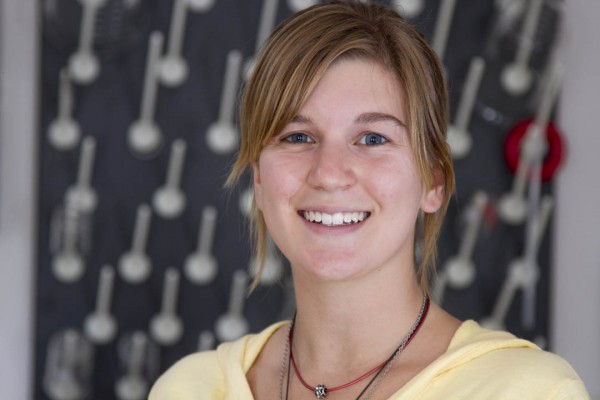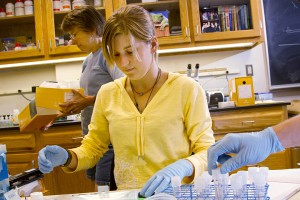
Summer Student Work: Of snails, brains and hunger
For Jenny Bergeron ’14, summer is passing at a snail’s pace — in a good way.
Along with Colin O’Leary ’13 and Alex Hulse ’14, Bergeron is studying snails and their neuropeptides: tiny molecules that help neurons talk to each other.
This spring, Bergeron was accepted to the Tufts Medical School Early Assurance Program, which guarantees admission to outstanding scholars two years ahead of matriculation. She plans to study abroad in Denmark this fall.

Student researcher Jenny Bergeron ’14 has been accepted to the Tufts Medical School Early Assurance Program. Photograph by Phyllis Graber Jensen/Bates College
Name: Jenny Bergeron ’14
Hometown: Lewiston, Maine
Major: Biochemistry
Research adviser: Nancy Kleckner, associate professor of biology, who studies the neurological systems of ponds snails like Helisoma trivolis
Research funding: IDeA Networks of Biomedical Research Excellence, a program of the National Institute of Health. INBRE grants are awarded by the college to faculty and students conducting research in cell and molecular biology, biochemistry and neuroscience.
1. Say you’re sharing an elevator with a famous hip hop artist who’s curious about your research. How would you describe your work?
Our research is looking at neuropeptides in snail brains in relation to feeding behaviors. We can use this information to discover how neuropeptides work in the human brain — but the snail brain’s a lot easier to work on. It’s smaller and there are fewer things going on. It’s less complex.
2. What made you decide to study snails?
It is Nancy’s project, and she asked me to join. But I think she picked Helisoma because — well, it’s a pretty snail to begin with! — but there’s not a lot of data out there on it. I think that makes the research a lot more interesting than just redoing other people’s work.
3. What do you enjoy most about the research?
My favorite part of the research so far is that we got to do six weeks of it at Mount Desert Island Biological Laboratory. That is a really cool environment. We had a lot of scientists our age around, and we had morning seminars and took a research presentation class. It was really exciting being in that environment, and to talk about your research and other people’s research was very collaborative.

Bergeron concentrates in the lab while her adviser, Nancy Kleckner, works in the background. Photograph by Phyllis Graber Jensen/Bates College
4. What’s the best part of working with your adviser, Nancy Kleckner? The most challenging?
The best part is that she’s from Bates. Many people at MDIBL don’t work with a professor from their college, so they drop off their research and never see it again. But since Nancy’s from Bates and she was a visiting scientist up there, she’ll still be working on it and I’ll be able to see the project transform over the next two years.
Plus, she’s really nice.
The most challenging part is not really her, but the fact that I haven’t taken neuroscience. So working with neuropeptides is definitely challenging, trying to figure out how the neuroscience works.
5. How does this summer research connect to your course work?
I’m a biochemist, and the research I’m doing with Nancy involves a lot of techniques that we use in cellular and molecular biology. I hear that a lot of the same techniques will come up in my future classes, too. So the research this summer is the same techniques, just different organisms.
6. Best part of being on campus in the summer?
When you see your professor walking around in shorts or just finished playing tennis, it’s kind of fun. And everyone’s a lot more relaxed in the summer.




